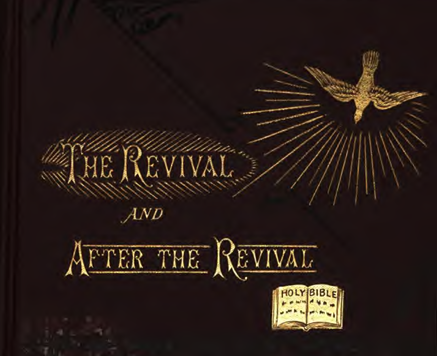There is also a religious revival. Where would the alternations that the revival idea implies be more likely to occur? The life of the spirit opposes the life of the flesh, which on its side is fostered by circumstances, inherited tendencies, and popular opinions, examples, and exhortations. The Christian life is a “race,” a “warfare.” It involves temptation and assault. It demands effort, even to the point of agonizing resistance and struggle. “Aim to enter through the straight gate.” What if sometimes faith fails, the will withers into irresolution, and the affections fasten themselves to things seen, near, and precious? What if the Slough of Despond discourages, the Mountain of the Law alarms, the atmosphere of the garden stupefies, and the delights of Vanity Fair fascinate? What if the eternal future seems like a dream and the golden present is a reality? And what if all or most of one’s neighbors agree on doubting the spiritual realm and delving into the things of this world? What if custom and fashion observe religious forms that are pleasant substitutes for a religion of self-sacrifice and philanthropic service, so that he who says, “Lord, Lord,” and who chants His praise in aesthetic worship, fancies himself fed and satisfied as to his spiritual nature and relieved of all solicitude as to his responsibility. This world is no friend to the grace that leads to God. And, yielding to its charms, Aaron and Miriam, Samson, David, and Peter, and whole tribes of God’s people have occasionally, in all ages, lapsed from the faith, losing the glow of love, the light of the divine witness, and the peace that came with their original faith. In God’s Church, there have been “broken walls” and “dead vines,” spiritual “adulteries,” returns to “Egypt,” “denials” of the Master, and manifold infidelities and deteriorations. The songs of the prophets were turned into lamentations because of these things. On this account, the voice of the Lord in the Word is so often the voice of rebuke and denunciation. The Savior wept because of these defections. He predicted and deplored them.
Even though Pentecost was close and amazing things were happening, the apostles saw early signs of the same bad things happening. Paul, who is now shown to be the real prophet, saw that these slip-ups would keep happening and have terrible effects in the “last days.”
Is decline certain death? No, thank God for “God is love.” He pities him like a father. He comforts like a mother. He welcomes the prodigal home with a royal welcome. He commands the rebuilding of the waste places. He plants his vines anew. He is like the dew to Israel. He remembers our frame. He forgives sin. He calls home his exiled ones. He puts sinners who rebel against his goodness to the test of his grace and offers to pour out blessings, limitless and free, upon them. He employs all means by which his tenderheartedness may be enforced. He uses great words full of grace: “abundant,” “exceeding,” “everlasting.” He breaks forth in surprising promises: “Let the wicked forsake their ways, and the unrighteous man his thoughts; and let them return unto the Lord, and he will have mercy upon them; and to our God, and he will abundantly pardon.” Read the prophecy of Hosea if you would rejoice in the boundlessness of God’s mercy. In Jesus Christ’s ministry, the possibilities of revival power appear. He heals the paralyzed and lepers. He raises Jairus’ daughter, the widow’s son, and the long-dead Lazarus. He sets forth Peter as an example of wondrous grace. He inspires Paul to cry out, “Unto him that is able to do exceeding abundantly above all that we ask or think, according to the power that worketh in us, unto him be glory in the Church by Christ Jesus throughout all ages, world without end. Amen.”
The fleshly life of man, the “world” he lives in, and the “prince of the power of the air” all pull the souls that Christ saved down, toward the earth, and toward hell. This is why there must be revival after revival if the work of redemption is ever to be done in the souls of men and in the society they create.
In God’s infinite love and power dwells the force by which revivals are secured. He was responsible for laying the groundwork. He deposits all of the subsequent layers. He will properly place the top stone amid the cries of men and angels.
We have need of revival, therefore, when we have wandered from God. We have a gracious right to seek and expect revival when we come penitently into God’s way to find the life he offers us. What a great need! What an urgent need for prayer and faith!
“With outstretched hands and streaming eyes, I frequently begin to grasp the prize; I groan, strive, watch, and pray; but, ah, my zeal soon fades.”
“Rise, Lord; quicken thy power, and awaken me, that I may no longer sleep.”
By J. H. VINCENT
Updated 2023 Nathan Zipfel

